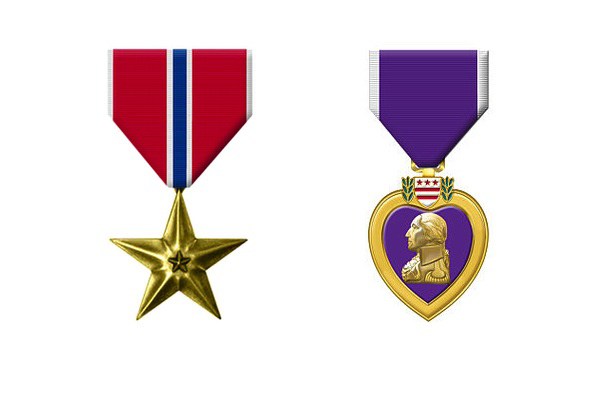
Wars kill, and somehow that death in battle is more hallowed than another. Service should be honored. The ones who live through a war might have lost something vital too. As we remember the wartime fallen this Memorial Day, let us also remember the harm we cause when we pursue mortal conflict.
My father was no flag waving patriot, though he was a Republican. World War II found him nearing the end of his college time at Oregon State. He paid for his tuition bussing tables at a frat house and spinning ropes to entertain dudes in Sun Valley. He enlisted because he knew otherwise, he’d be drafted, and maybe through enlistment he could become an officer. Their pay was better.
But he wouldn’t tell me about it. I was a third grader, drawing pictures of tanks and bombers, reading American Heritage books about every war I could. I even asked him about the medals I heard he’d gotten.
“Dad, what’s a Purple Heart for?”
He pulled on his Pall Mall and shook his head.
“How did you get yours?”
He looked away and held a long pause. “Shrapnel in my butt. Million-dollar wound they called it.” I had seen the divot in his buttock when he got out of the bath.
“How about the Bronze Star? What was that for?”
Here he shook his head even stronger and looked up and away. “They gave those to everybody.”
I tried many times to ask him about war, fighting, getting shot at or shooting at others. He would tell me nothing.
Maybe I just didn’t know how to ask my old man in a way he could relate to. Maybe it was my distance from him he felt, his only son. Maybe he was born with too much shame.
His birth was in a tent out by the creek because his dad’s family wouldn’t allow the woman/girl his father married six months before his birth into their respectable house.
Or maybe the war had damaged him, and he just couldn’t share that pain. I will never know.
Maybe it was the shame I felt, when the teacher asked, “What does your father do?” and I answered as I had been told, “He’s self-employed.” Because I couldn’t say he played poker for money and didn’t pay taxes on his winnings. He didn’t know anything about Libertarians, but Republican was as close as he could get fifty years ago.
I grew into my teen age years and my disrespect grew. Mark Twain talked about how the teenage son sees his father for a fool. Twain says the son marvels that the old man can learn so much as the son matures. But it was much later I grew to respect him; too late.
I was arguing with a friend about inherited intelligence. “Look at our family. My two sisters were valedictorians in high school classes for 400+, and I was salutatorian in a class of 500+, and my parents were pretty average.”
He smirked. “Are you sure?”
I can’t be.
Dad was very complex, even though he was a Republican.
Maybe it was when he beat me time and again in Scrabble that I saw him differently. Maybe it was when he was so tender with my daughters, and I didn’t remember that tenderness that my sight changed. I don’t know.
His drinking faded. His business failures did not burden me though I believe he carried them. And the war experience might have explained how we had to be so careful waking him up. Mom would say, “Dinners ready, go wake your dad.” And I, the youngest would have to.
“Dad!” I would call from the doorway. If I had to touch him, I knew to step back because he would lash out violently.
Wars kill. Wars main. Wars harm. Let us remember.
